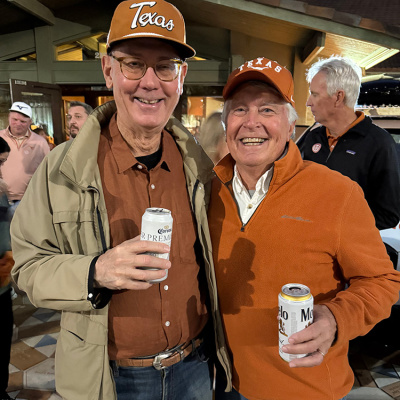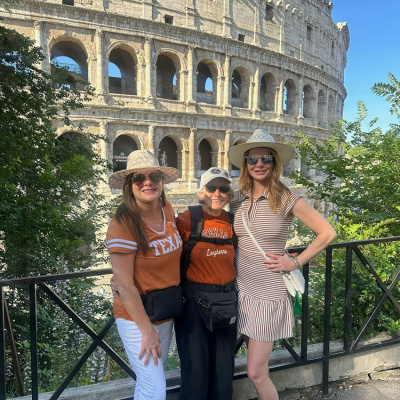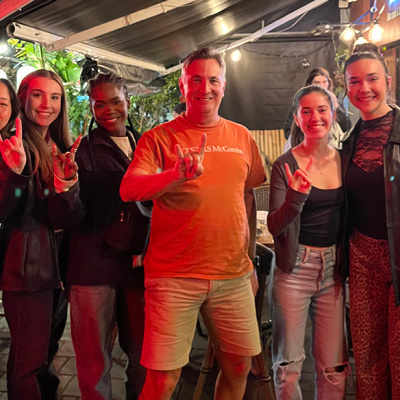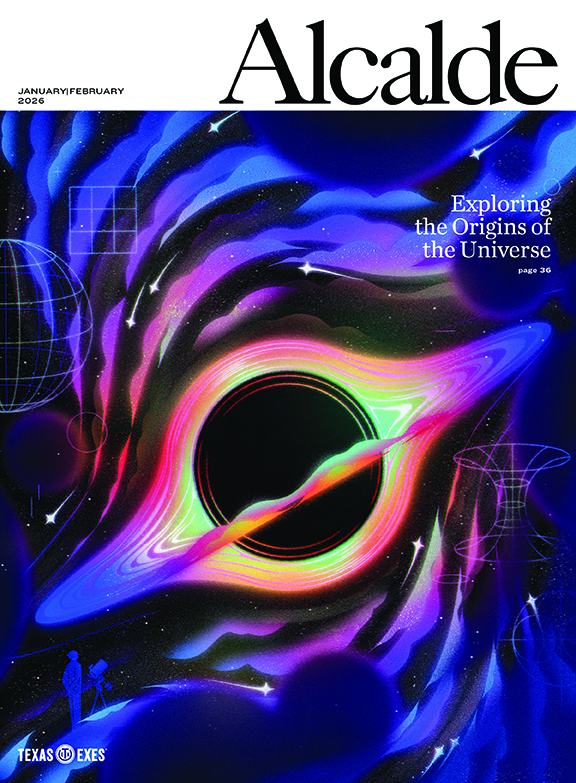Q&A: Musician Susannah Joffe Talks Artistic Evolution and Vulnerable Songwriting
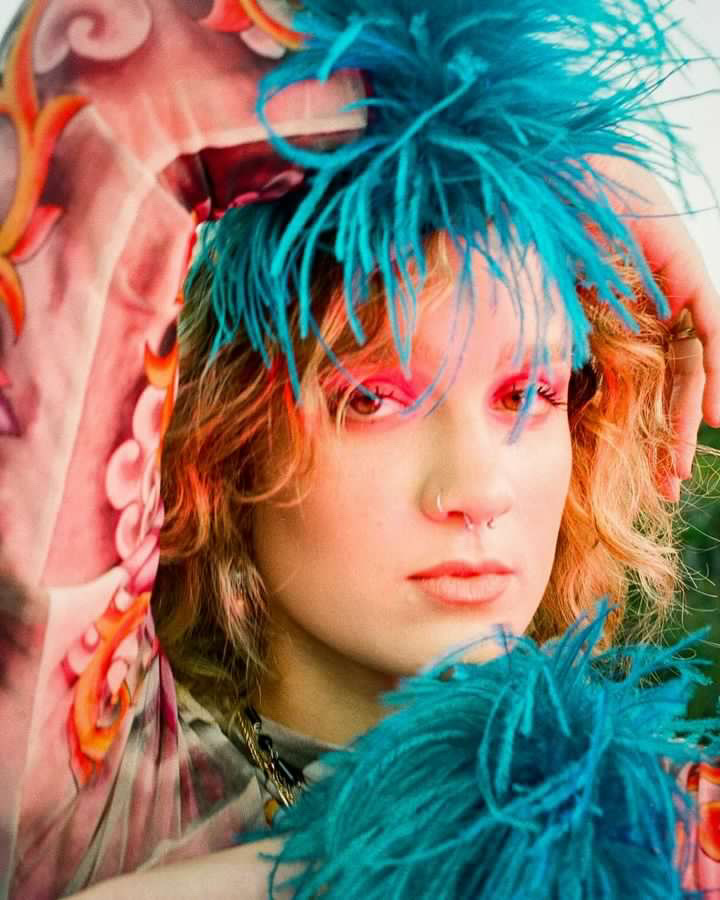
When Susannah Joffe, BA ’22, played her first gig at 16 years old, she was terrified. She stood alone on the stage at Strange Brew, an old Austin venue that has since shuttered, and stiffly performed for a crowd of family friends.
“I was so scared, I honestly hated it,” Joffe says. “I literally stood there on stage, holding my mic, and did not move the entire time.”
Now at 22, Joffe’s performances burst with creative passion. As an independent musician building her career in New York City, she is known for her bold makeup and bright queer pop aesthetic. Gone are the days where Joffe shyly sings in restrained black dresses and youthful ringlets—her personality now shines through her distinctive visuals and vulnerable lyricism.
In 2021, Joffe’s released her first hit, “Backseat,” which garnered 1.2 million streams on Spotify with its dreamy blend of bedroom pop and bluesy vocals. Since then, Joffe has used her Radio Television and Film degree to direct several music videos and promotional TikToks, coupling her love of music and affinity for visual art. In November 2022, Joffe completed her first tour with the indie band Sun Room, and she is now gearing up for a second tour in Texas alongside singer-songwriter Adam Melchor later this spring. Although the Austin native is now based in New York City, she and her dad frequently co-write songs over long FaceTime calls and visits home.
Joffe spoke to the Alcalde about how she first made her break in the industry, what it’s like sharing vulnerable lyrics with her family and fans, and her upcoming projects.
How did you first fall in love with making music?
I was co-writing with my dad my entire life because songwriting is his passion. He’s been writing songs since he was in high school, just for himself. And so, when I was in high school, we would co-write, but I was so shy about it that it was mainly him coming up with lyrics and melody, and then me [giving suggestions]. It was collaborative, for sure, but I definitely wasn’t taking any risks or venturing out on my own. With writing my own songs, I didn’t start until COVID. And originally, it was just something I just used to cope with some stuff that happened in the past that I hadn’t really dealt with and to cope with stuff that was going on. And then I went through a breakup that really [messed] me up. I had really severe depression, really severe intrusive thoughts, and my therapist … gave me a whole list of things to try. Playing guitar was the one thing that would get me to chill out every single time. So, it truly came from a place of me needing music to heal and balance my mental health. A lightbulb moment came on during COVID and I was like, okay, music is what I want to do with my life. It just feels like it comes really naturally to me.
What is it like sharing such personal lyrics with your dad and your listeners?
It’s definitely been challenging. I have a lot of regret about the way I’ve gone about it because I think when I first started putting out music, I didn’t really care about maintaining a boundary between personal information and public information. I was like, I’m just using this to cope, and I did, but at the same time, I regret the extent of which I shared. Even now, I’m writing songs and I’m like ‘I don’t want my friends to see this.’ But you just have to suck it up and [express your] feelings sometimes. I think as a person, it’s made me a lot more comfortable with being vulnerable and being open, which is something I’m not good with naturally.
How did your career grow after you released music on streaming platforms?
The first few songs I released aren’t on streaming platforms anymore. I recorded them in high school and just put them out. They had like 1,000 streams, and I didn’t really like them, so after I started getting more listeners, I was like ‘nobody can hear this.’ But then I put out “Nobody Wants Me Tonight,” and a lot of people started listening to it. I was kind of surprised because it was just a very barren demo. But I feel like the first song where I actually did a release was “Backseat.” And that was really wild because I put that out right when people were starting to figure out TikTok was a really good tool. Before there were a ton of people on there, it was really easy promoting that song because not a lot of people were doing that yet. That kind of is what helped me get involved with the industry because that song did really well on Spotify. People in the industry only really pay attention when there is some kind of virality going on, and that song lent that to me for a second. I also had a music business professor at UT who, after the semester ended, started helping introduce me to people in the industry. That’s really how I got to where I am now.
What has been the hardest thing about working in the music industry?
It’s a lot harder than people realize. I kind of love it because I tend to run on the side of being a workaholic, so I love sitting down and sending a million emails and DMing a bunch of playlisters. But when you’re an independent artist, you’re doing literally everything yourself. I think the hardest part is all the social media stuff. Mentally, there’s definitely some wear and tear when everyone’s telling me I need this viral moment. And so there’s this pressure, day in day out, to be posting a certain number of things or a certain type of content or getting a certain number of videos under your sound by XYZ date. It’s become so formulaic that it’s a bit exhausting and feels like it’s kind of killing the artistry and originality. But at the same time, I owe a lot of the opportunities I’ve had to TikTok and to social media.
In spite of the draining elements of social media, what is continuing to inspire you as an artist right now?
At the end of the day, it boils down to the fact that I am innately passionate about this. There is nothing I love to do more in my free time than to sit and write songs by myself or mess around and make demos on GarageBand. And playing live, like the tour I did with Sun Room, I can confidently say has been some of the happiest memories of my life so far. And I think when I sit and think about all that, I’m reminded of the larger picture. I try to tell myself if you work at this, if you put everything into this, it will happen for you.
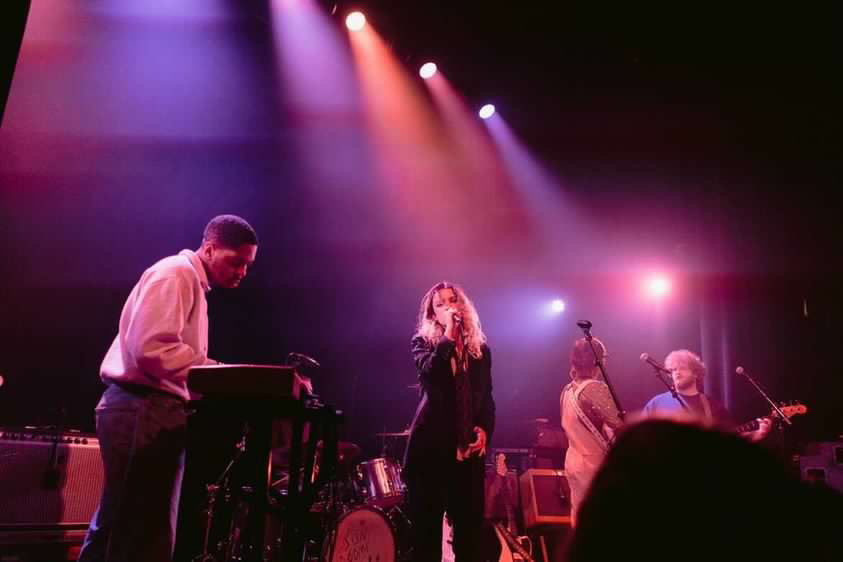
How did growing up in Austin shape you as a musician?
Because my dad is a songwriter, he would take me to a lot of songwriting competitions and [expose me to] the scene he was in, listening to music or playing shows. It was very much Texan music, leaning more on the side of country. I think when I first started writing, I was trying to distance myself from that. But recently, without meaning to, I still kind of write that way. The influence is there in terms of song structure and big choruses. I also kind of innately have a country voice, which is something I hated [at the time], but my voice is unique in that way. My influence from that Austin music is something I just can’t escape, and I’ve been wanting to lean more into it recently. There’s a song that my dad and I just started writing that I’m going to record soon, hopefully, that has a kind of western Sheryl Crow vibe. And two years ago, I would have been like, “get me away from that.” But now, I’m excited about it.
What was it like leaving Austin and moving to New York after graduation?
I’ve been in Austin my entire life, so I had to leave because I felt really stuck and stagnant there. When I first moved, I was like, this hasn’t been a hard change at all. I’m usually really bad with change, but it was fine. Recently, though, I’ve been struggling with it a little bit more. I feel like I established myself in Austin as a musician and felt really secure in myself. But now, I’m in this completely new city and nobody knows who I am. I kind of have to restart that process, and that’s super intimidating. But I already feel so much more in tune with my creativity. I started painting for the first time in three years and went to a figure drawing class and a sewing class. Being in the city, there’s so much art and everyone expresses themselves in their own way. People dress crazy on the street and no one bats an eye, which is so freeing and super exciting. So, though it is kind of hard because I’m like a small fish in a big pond …it’s a good challenge and good growth [opportunity]. I’m doing new stuff that’s more challenging, and I think it will inform my songwriting and my visuals.
What can fans expect to see from you next?
I’m doing a Texas tour with Adam Melchor. I’m doing shows in Austin and Houston and Dallas with him. I’m super excited about it because the venues are bigger than the Sun Room shows. And I played around in Austin a lot, but I’ve never played at Scoot Inn. So that’s something I’m looking forward to because I grew up in Austin and it feels very full circle…I’m also working on another EP and more songs, and I'm doing a few collaborations with other artists that I'm excited about.
